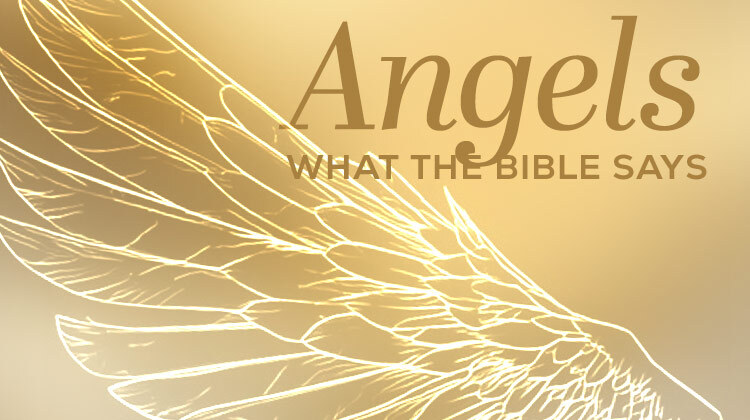We all have questions about angels. Where do they reside? Do they have physical bodies? Do angels ever die? God’s Word provides detailed answers to these questions. Here’s what the Bible says about some of them.
Where do angels reside?
Heaven is the dwelling place of the angels because angels belong exclusively to God.
The best definition of heaven is that it’s God’s dwelling place. “Heaven is my throne,” God says; and that is where angels work and live. They inhabit the throne room of God, because they belong to God. But also keep this in mind: When Paul tells us to set our minds and hearts on things above (Colossians 3:1-2), he points out specifically that heaven is where Christ is. Angels are there too, but Paul doesn’t put them in the spotlight. It’s Christ who can make us heavenly minded, not angels.
I say to you that in heaven their angels always see the face of My Father who is in heaven. Matthew 18:10
Do angels have physical bodies like humans?
Angels are real but without material substance as we think of it (Hebrews 1:14). They apparently have no physical nature, no breath or blood—God created them as non-physical beings. If they occupy some form of permanent bodies, these would be spiritual bodies, perhaps like the ones we’ll wear someday in eternity. It must be their spiritual nature—as well as their spiritual holiness—that allows angels the continual proximity to God they enjoy.
Receive Daily Devotions from David Jeremiah
Sign up to receive email devotions each day!
How many angels are there in existence?
No precise count is given in Scripture, but there’s plenty of evidence that they make up a mighty multitude. In Revelation 5:11, John says he saw “ten thousand times ten thousand, and thousands of thousands of angels around the throne.” To give you a perspective on how many angels this is, the average football stadium in America holds about 50,000 people. It would take some 2,000 stadiums of that size to hold 100,000,000 people. The total number of angels John saw may have far exceeded 100,000,000 —“ten thousand” was the highest numerical figure used in the Greek language. “Ten thousand times ten thousand” may have been John’s way of describing an inexpressibly large company of angels. In fact, Hebrews 12:22 says, “But you have come to Mount Zion and to the city of the living God, the heavenly Jerusalem, to an innumerable company of angels,” indicating that the population of angels is so large that they cannot be numbered.
When were angels created?
In the Old Testament the Lord told Job that angels were already on the scene to celebrate when the earth was created: “The LORD spoke to Job... ‘Where were you when I laid the earth’s foundation... while the morning stars sang together and all the angels shouted for joy?’” (Job 38:1-7, NIV) Job wasn’t there when the earth was formed, but the angels were; and they were having a good time of it too (verse 7). So it’s very likely the angels are older than anything in the world as we see it.
Do angels ever die?
In Daniel 9 the angel Gabriel appeared to the prophet Daniel. Then more than five hundred years later, this same unchanged Gabriel appeared to Zacharias, the father of John the Baptist (Luke 1:5-25). And in Luke 20:36 we read: “Nor can they die anymore, for they are equal to the angels and are sons of God, being sons of the resurrection.”
As spiritual beings, angels know nothing of what it’s like to become ill, grow old, and eventually die. Someday we too will be beyond the reach of those afflictions. We and the angels will share permanent citizenship in God’s heavenly kingdom forever.
Has God created more angels since their initial creation?
I have no biblical reason to believe that God has created any more angels. And apparently there’s been no reduction in their number either, since angels do not die. Nor has there been any increase, since angels don’t reproduce—according to Jesus’ statement that angels don’t marry (Matthew 22:30). We have as many angels today as we’ve ever had.
Do angels receive salvation?
Redemption is not a personal reality for angels, but they are excited about it on our behalf (1 Peter 1:12). The angels actually rejoice when people are saved (Luke 15:10). But they cannot testify personally to something they have not experienced. This means that throughout eternity, Christians alone will give personal witness to the salvation that God made possible when the Lord Jesus wiped our sin away and gave us His righteousness. Likewise, I say to you, there is joy in the presence of the angels of God over one sinner who repents. Luke 15:10
Are God’s angels all the same?
Each angel has his own job description and carries out God’s will. To find out about the varied types and tasks of the angels, let’s take a look at a few of the terms the Bible uses to reference angels.
Hosts:
Throughout the Bible, angels are called “the hosts of the Lord.” The word “host” comes from the Old Testament Hebrew word tsaba and the New Testament Greek word stratia. Both terms mean “a well-trained army”—one that is prepared for war. God’s angels are organized and ready to respond to His every desire and command.
Seraphim:
This term, which literally means “burning ones,” is only mentioned in the book of Isaiah. These angels dwell so close to the presence of God that they burn with a holy brilliance. According to Isaiah chapter 6, the seraphim have six wings. Two wings cover their faces in reverence, two wings cover the seraphim’s feet in humility, and two wings are for flying. The seraphim also have human features such as feet, hands, and voices.
Cherubim:
Cherubs are angels that stand close to God’s throne (and they don’t even vaguely resemble the winged infants we usually think of as cherubs). Cherubim seem to have a more human appearance than the seraphim. Each cherub has four faces: the face of a man, the face of a lion, the face of an ox, and the face of an eagle. They have human hands and four wings instead of six. Unlike other angels, the cherubim never convey messages from God to people. They are also never directly called angels. The first time cherubim appear in the Bible is at the gate of the Garden of Eden (Genesis 3:24). God had the cherubim guard the gate with flaming swords after Adam and Eve were evicted from Paradise.

